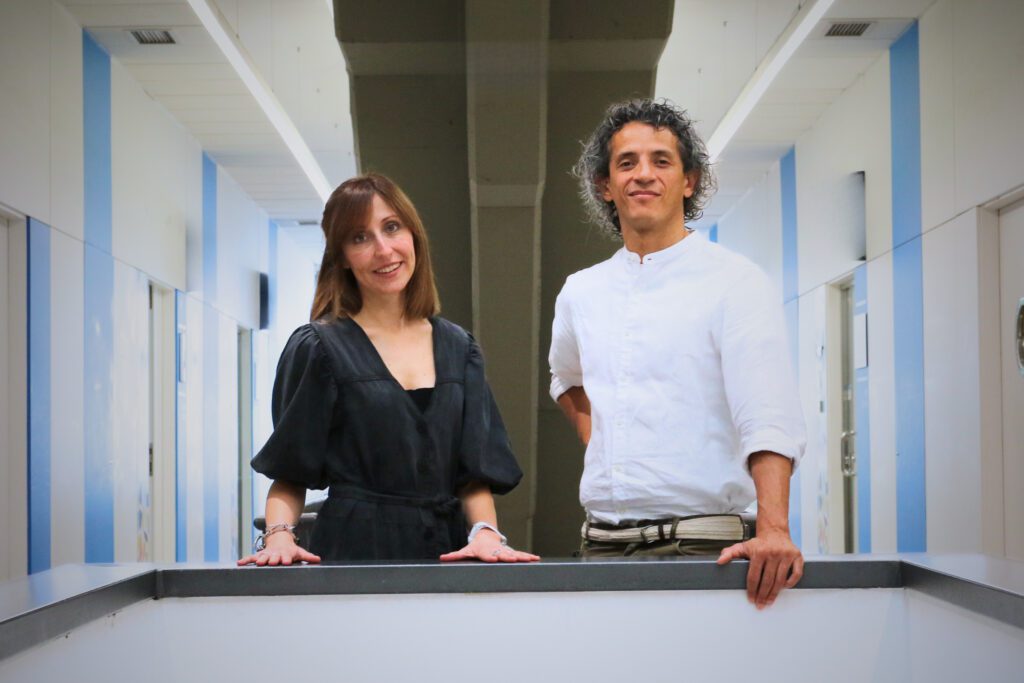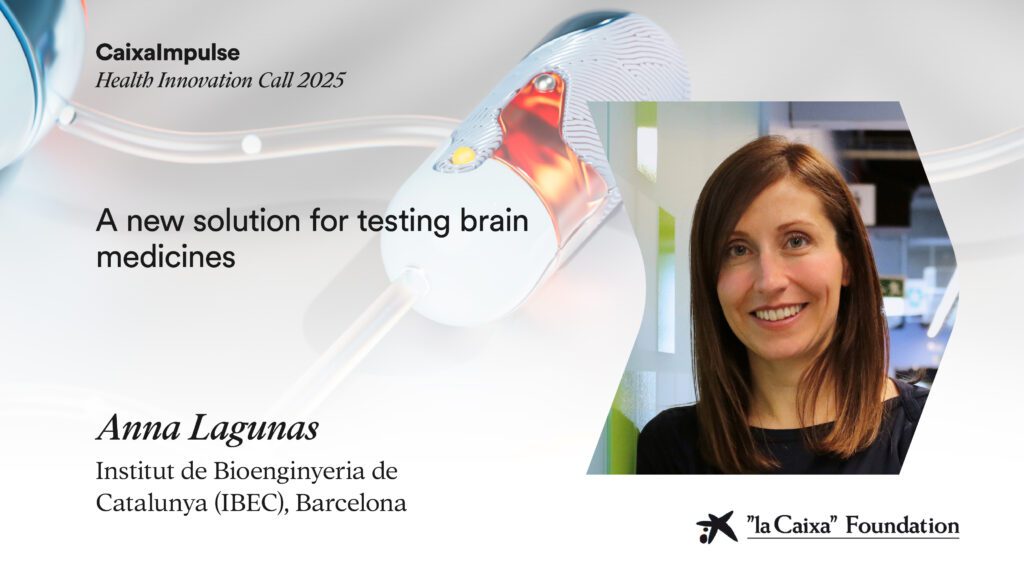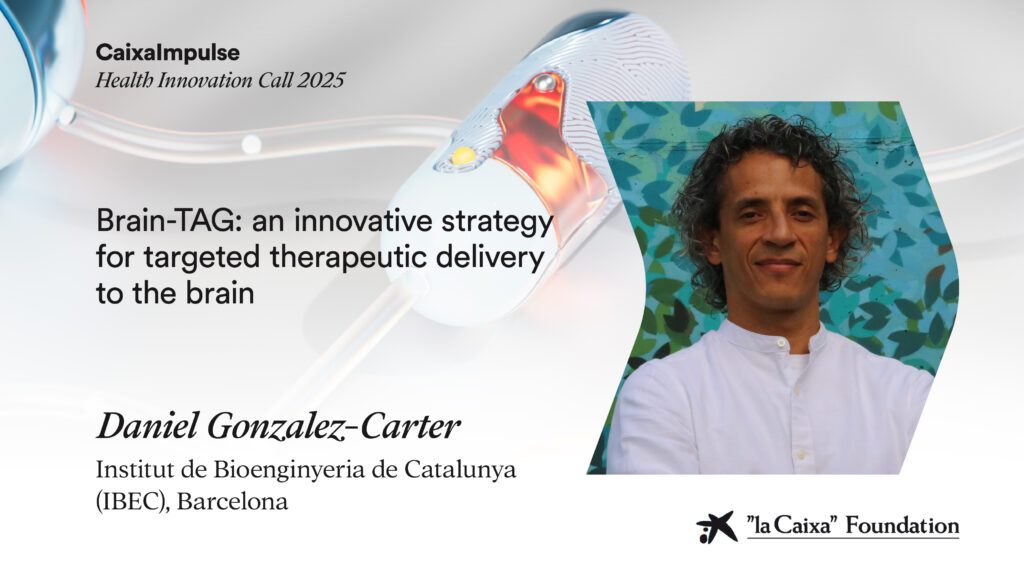Anna Lagunas and Daniel González-Carter, who are both senior researchers at the Institute of Bioengineering of Catalonia (IBEC), will be leading these projects as part of the 2025 edition of the programme. This initiative by the “la Caixa” Foundation aims to accelerate the commercialisation of biomedical innovations to make them available to patients who need them more quickly. The two IBEC projects focus on treating diseases that affect the brain.

Two projects led by the Institute for Bioengineering of Catalonia (IBEC) have been selected for the 2025 CaixaImpulse programme call for proposals, which is promoted by the “la Caixa” Foundation.
Anna Lagunas and Daniel González-Carter, who are senior researchers at IBEC in the Nanobioengineering and Molecular Bionics groups respectively, will lead the projects, which focus on treating diseases that affect the brain. Lagunas’ project involves developing a device called a blood-brain barrier-on-a-chip model, which is intended to provide a more humane and accurate method of drug testing. González-Carter’s Brain-TAG project involves creating special ‘stopping points’ in blood vessels in the brain to enable targeted drug delivery to this organ.
Both projects are among the select 7% chosen from the 428 applications received in this call.
The CaixaImpulse programme supports biomedical projects from research centres, hospitals, and universities in Spain and Portugal. The initiative aims to accelerate the market launch of these innovations, bringing them closer to the patients who may need them. It also encourages the development of new products, services, and companies in the fields of life sciences and health.
A new solution for testing brain medicines

Finding treatments for brain diseases is highly challenging because the brain is protected by a natural barrier that blocks most medicines from entering. This barrier plays a crucial role in shielding the brain from harmful substances but also prevents many potentially effective treatments from reaching their target. Current methods for testing new treatments, such as experiments on animals or simplified lab models, often fail to provide accurate results. Animal testing raises ethical concerns, and the outcomes frequently do not predict how medicines will behave in humans.
To solve this problem, this project proposes a new device that mimics the natural barrier protecting the brain. This device, called a blood-brain barrier-on-a-chip model, re-creates the human brain’s protective environment more accurately than previous methods. Using advanced sensors integrated into the device, it allows scientists to measure how well medicines can pass through the barrier, combining light-based tools and electrical readings. This innovation enables researchers to test brain-targeted therapies on a more realistic and predictive model, improving the reliability of results and reducing the need for animal testing.
The ultimate goal of this technology is to speed up the discovery of treatments for conditions like brain diseases, while lowering costs and making the process more ethical. By replicating the conditions of the human brain more closely, this device can identify which medicines are more likely to succeed in clinical trials, potentially saving years of research and significant expenses. The developers are now working to improve the device so it meets market demands, secure its intellectual property, and validate its performance for eventual use in healthcare.
This groundbreaking technology represents a shift towards more humane and precise drug testing methods. By offering a better way to develop treatments for brain conditions, it could transform how therapies are created, benefiting patients and advancing medical research worldwide.
Brain-TAG: an innovative strategy for targeted therapeutic delivery to the brain

Treating diseases that affect the brain is extremely difficult, as most treatments cannot reach the brain due to its protective vasculature. To try to overcome this obstacle, traditional methods attempt to use natural features on the blood vessels to guide medicines to the brain. However, these features are not unique to the brain—they are also present in other organs like the lungs and the liver. As a result, medicines often end up in places where they are not needed, lowering the efficacy of therapies and increasing unwanted side effects. Hence, many common problems, such as Alzheimer’s disease and various brain cancers, could be treated more effectively if medicines were delivered specifically to the brain, leaving the rest of the body unaffected.
The Brain-TAG project introduces a completely new solution to this problem. Instead of depending on natural features, the research group has developed a process to create special “stopping points” only on the blood vessels in the brain. These stopping points are generated by injecting proteins which are displayed specifically on the brain’s blood vessels. This method is unique because it does not rely on what the body already has; instead, it creates new, artificial sites where medicines can attach. In tests with healthy animals, the Brain-TAG stopping points have helped to bring treatments directly to the brain.
The main goals of the project are now to confirm that this method works effectively in sick animals and to understand exactly how these proteins connect to the blood vessels of the brain. If successful, medicines could be sent straight to where they are needed in the brain, making treatments more effective and safer, with fewer problems in the rest of the body. This breakthrough offers hope for improved care for people with serious brain conditions and may change how these diseases are treated in the future.
About CaixaImpulse
The ”la Caixa” Foundation launched this programme in 2015 to support innovation and knowledge transfer in biomedicine and health. Since then, the organisation has allocated €28.8 million to 263 projects, leading to the creation of 54 spin-offs. These spin-offs have obtained additional co-financing worth more than €180 million through other competitive calls for proposals or from private investors.
This year’s call for proposals is being carried out in collaboration with Criteria Bio Ventures, CriteriaCaixa’s venture capital fund specialising in biotechnology and health sciences. In Portugal, the call is being carried out in partnership with Fundação para a Ciência e a Tecnologia (FCT), which is part of the Portuguese Ministry of Science, Technology and Higher Education. For this edition, FCT is subsidising two of the Portuguese projects selected in Phase 1.





